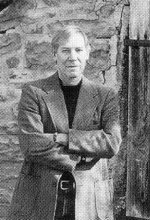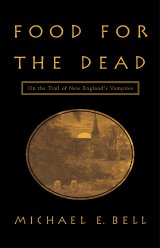Interview with a REAL Vampire Stalker
Our exclusive interview with the author of "Food for the Dead: On the Trail of New England Vampires". Author and folklorist Michael E. Bell, who has a Ph.D. in folklore, has been consultant to the Rhode Island Historical Preservation & Heritage Commission since 1980. SeacoastNH.com editor J. Dennis Robinson interviewed the vampire stalker and filed this eerie report.
SEACOASTNH.com
Your study offers a wholly new definition of vampires, far from the familiar Hollywood lexicon. What exactly did our New England ancestors do with the exhumed bodies of their relatives and why?
MICHAEL E. BELL:
 When consumption (which is what people used to call tuberculosis that settled in the lungs) took hold in a family, some people in the outlying areas of New England would open the graves of their deceased relatives, looking for signs that they considered out of the ordinary -- such as liquid or "fresh" blood in the heart. The heart would be cut from the body and burned to ashes. Often the ashes were administered, in water or some medicine, to sick family members. The belief supporting these practices seemed to be that there was some sort of evil, perhaps a demon, residing in one of the bodies that was draining the life from others in the family.
When consumption (which is what people used to call tuberculosis that settled in the lungs) took hold in a family, some people in the outlying areas of New England would open the graves of their deceased relatives, looking for signs that they considered out of the ordinary -- such as liquid or "fresh" blood in the heart. The heart would be cut from the body and burned to ashes. Often the ashes were administered, in water or some medicine, to sick family members. The belief supporting these practices seemed to be that there was some sort of evil, perhaps a demon, residing in one of the bodies that was draining the life from others in the family.
SEACOASTNH.COM:
Is this really vampirism, or something else entirely?
MICHAEL E. BELL:
The procedures are identical to those practiced in Eastern Europe, particularly Romania. In New England, the people involved never referred to their relatives as vampires. Most of them probably had never even heard of vampires. It was outsiders who recognized the practice as vampirism and labeled it so.
SEACOASTNH.COM:
You're from Rhode Island, home of Mercy Brown. Is that the story that got you started?
MICHAEL E. BELL:

Yes, it was a descendent of the Brown family who shared his family's story with me that got me following the vampire trail. His story was that people in the family were dying of some mysterious disease and nothing that they tried could stop it from spreading. So the remaining men of the family got together and decided they had to go to the cemetery and exhume the body of Mercy, the last to die. When they uncovered her, they saw that she had turned over in the grave, and they found fresh blood in her heart. They cut out her heart and burned it on a nearby rock and fed the ashes to her sick brother, Edwin. Although Edwin died two months later, no one else became ill. So the family believed that had taken care of the problem.
SEACOASTNH.COM:
And what did you find nearby in New Hampshire?
MICHAEL E. BELL:
A Freewill Baptist Minister who kept a journal from 1810 to 1865 described an exhumation he had witnessed in 1810 in Barnstead, New Hampshire. A man named Denitt was dying of consumption, so people in the community went to the graveyard and dug up the body of his dead daughter, Janey Denitt. In this case, they "had a desire to see if anything had grown upon her stomach," according to the journal entry, "but found nothing as they supposed they should." The next day, the minister, Rev. Place, went to Loudon where the people told him of a similar incident that had occurred among the Shakers several years earlier.
SEACOASTNH.COM:
Can you tell us what conclusions 20 years of vampire stalking research have led you to?
MICHAEL E. BELL:
I believe that this practice was probably much more prevalent and widespread than we might think. The few cases I've found are just the tip of the iceberg. I think that this practice reveals how people deal with looming death that is considered untimely or premature -- they will not accept it without putting up a fight. If the medical profession says, "I can't help you," then people will look elsewhere for an answer. And folklore always has an answer. It may not be an effective answer, but in the end, even a wrong answer is better than none. Doing something beats doing nothing.
CONTINUE vampire interview with Michael E. Bell



 Smuttynose Murders
Smuttynose Murders




 When consumption (which is what people used to call tuberculosis that settled in the lungs) took hold in a family, some people in the outlying areas of New England would open the graves of their deceased relatives, looking for signs that they considered out of the ordinary -- such as liquid or "fresh" blood in the heart. The heart would be cut from the body and burned to ashes. Often the ashes were administered, in water or some medicine, to sick family members. The belief supporting these practices seemed to be that there was some sort of evil, perhaps a demon, residing in one of the bodies that was draining the life from others in the family.
When consumption (which is what people used to call tuberculosis that settled in the lungs) took hold in a family, some people in the outlying areas of New England would open the graves of their deceased relatives, looking for signs that they considered out of the ordinary -- such as liquid or "fresh" blood in the heart. The heart would be cut from the body and burned to ashes. Often the ashes were administered, in water or some medicine, to sick family members. The belief supporting these practices seemed to be that there was some sort of evil, perhaps a demon, residing in one of the bodies that was draining the life from others in the family.















